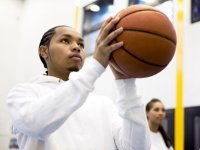Helping Students Develop the Skills to Focus
Your content has been saved!
Go to My Saved Content.In Dan Goleman's new book, Focus: The Hidden Driver of Excellence, he shows the importance of being able to direct and sustain our attention on everything from, well, everything! Not paying attention is downright dangerous. The inability to focus and sustain attention can rob us of relationships, deep knowledge, career accomplishment, peace of mind, and high test scores. But, as Goleman's book makes clear, we can learn to focus.
A number of social, emotional learning curricula have developmentally sequenced activities to build this skill over time. Below, you will find an activity adapted from the Social Decision Making/Social Problem Solving curriculum. With adaptations, as noted, you can literally use this lesson plan for grades K through 8. The lessons have a dual focus (pun intended!) in that they also build vocabulary and language skills. It is based on the enduring favorite children's game, "Simon Says."
Instructions:
Step 1: Good listening is very difficult. When is it important to be a good listener?
[Take a few responses: during a test, during an emergency, when someone is giving you instructions about when and how to do something, when someone you care about is telling you something important.]
Step 2: We are going to practice listening. I am going to read you some words. [Use List 1] I want you to clap your hands every time you hear the word, "cat," and only clap when you hear the word "cat."
[After they are finished, comment on how they did. Ask, "What was challenging about that?" "What word was most confusing to you?" "What helped you to listen well and only clap on "cat"?]
Step 3: Now, we are going to try again. I will read you some words from the same list, but this time, I want you to stand when I don't read the name of an animal. When I read the name of an animal, you should be sitting down in your seat. [Adjust the pace to make it a little challenging.]
[After they are finished, ask if this was harder or easier and why. Ask, "What did you do this time to help you concentrate more?" Expect them to say that they looked at you doing the reading, they kept themselves still, they faced you, or that they kept thinking about what the instructions were. You may want to keep and post a list of "Ways to Focus Better" for students to refer to when their attention is wavering.]
Using the List Words
Repeat as needed with the other lists. For List 2, try "cat" again as a focal word, and then try using articles of clothing as a challenge. They can clap, stand or sit, snap their fingers, raise one or two hands -- whatever will keep it interesting.
For List 3, the keyword is tree. The challenge would be things found in a backyard or park area.
For List 4, there are many complicated challenges you can try. Consider words that relate in any way to animals (this is also a vocabulary/concept grouping issue. You may need to repeat this a second time, after reviewing all the words that have something to do with animals, including trunk, steak, bleat, hoot, howl, meat -- this will also help them with homonyms); words that don't start with the letter "b", words that do or do not end in the letter "k" or "t".
LIST 1
cuts coat horse cut dog cow cat
horse cuts cut cow cut dog cat
coat cute horse dog cute cow dog
cow cut cat cat dog horse cut
LIST 2
cat shoes pants coat cute dress cut
cute cut pants shoes dress cat shoes
coat dress pants cut dress shoes cut
coat pants cute cat coat cut shoes
cute coat cat pants cat cute dress
LIST 3
bush leaf true tree grass tire tear
tree true leaf tear bush tree leaf
bush true tire tear grass tire grass
true tear leaf bush grass leaf tear
tire true tree tire tree grass bush
LIST 4
break beak bent boat bark bow
beak boot beak beat bleat boat
coat cat bat beak boot hoot howl
break steak beat meat mote boat bark
bunk flunk bunk gunk trunk beak beet
Bottom Line
The students have fun with the activities, but the most important element is reflecting on what helps different people listen and pay attention. And through that process -- and practice -- students develop more ideas and strategies to improve their focusing skills.
